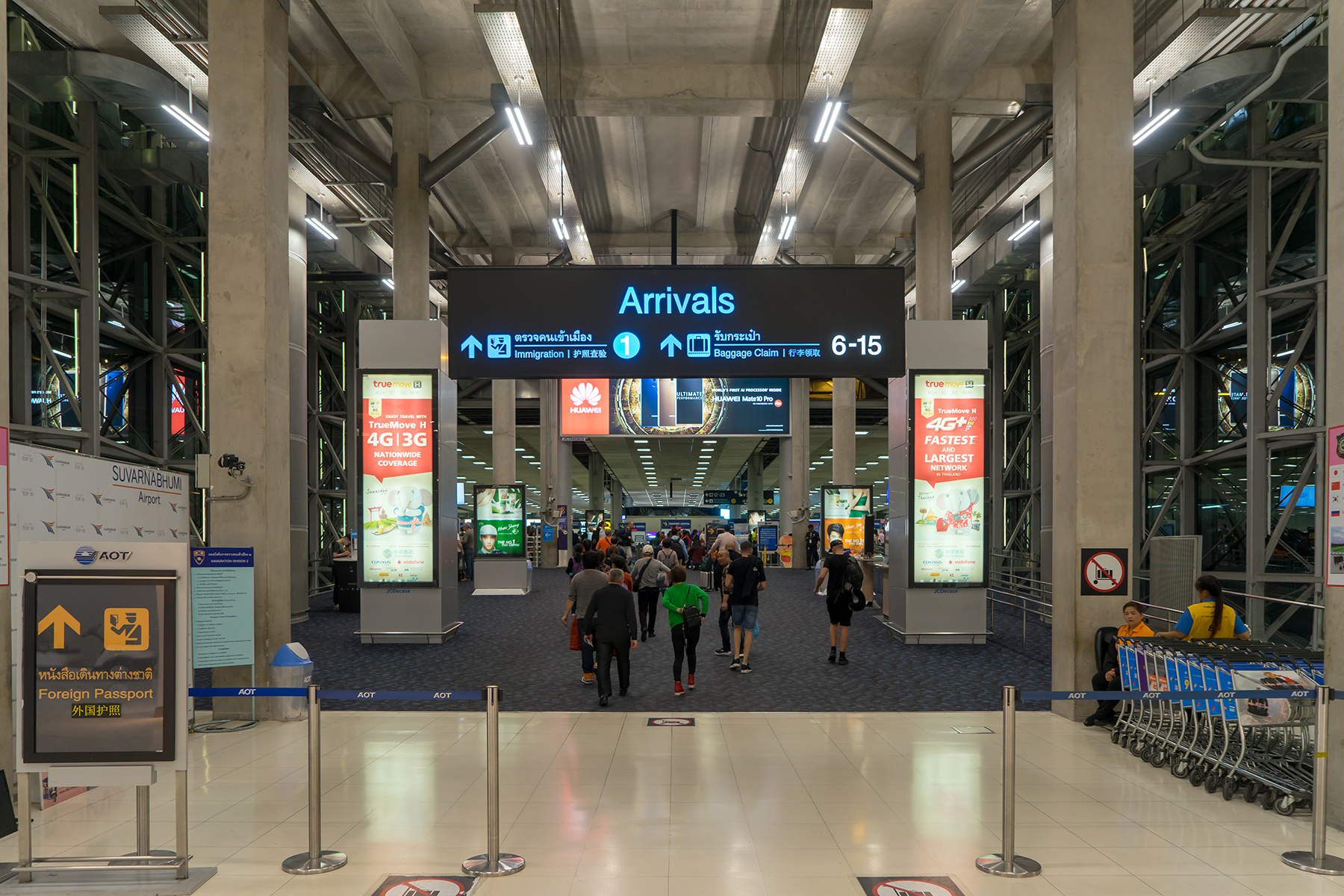Thailand is a popular place for expats, but finding a job that allows you to settle here can be challenging. However, there are opportunities for internationals to work in the Land of Smiles if you know where to look. Ideally, you should find a job before moving to Thailand so you can secure your work visa outside of the country.
Learn all about these aspects of jobs and work in Thailand:
- Working in Thailand
- What are the requirements to work in Thailand?
- How do you find jobs in Thailand?
- English teaching jobs in Thailand
- How do you find a job in Bangkok?
- How do you find a job outside of Bangkok?
- Self-employment and freelancing in Thailand
- Traineeships, internships, and volunteering in Thailand
- Applying for a job in Thailand
- Support while looking for a job in Thailand
- Starting a job in Thailand
- Useful resources
Working in Thailand
What is the Thai job market like?
The unemployment rate in Thailand is extremely low, at 0.85% as of September 2023. However, this is partly because so many people work in informal employment and cannot claim unemployment benefits (เงินชดเชยการว่างงาน).
Additionally, anyone who reports working for at least an hour a week is not counted as unemployed. This leads to the statistics being artificially low.
What is Thailand’s job market like for internationals?
Finding work as an expat in Thailand can be challenging, as many jobs are legally prohibited for foreigners. These include manual work, hair or beauty treatment, craftsmanship, guiding tours, and clerical work.
Moreover, many smaller companies don’t want to jump through all the loopholes to secure the required visa and work permit (ใบอนุญาตทำงาน). One way around this is to find a job overseas with a company that has a presence in Thailand and get transferred over.
While there are far fewer multinational companies in Thailand than, for example, Singapore, the country is still home to a few major international companies. These include Microsoft, Google, Aetna, Agoda, and IBM. Additionally, many Japanese companies, including Yamaha, Toyota, Nissan, and Honda, have manufacturing facilities in Thailand.

Although many skilled roles are available to the Thai workforce, internationals take up relatively few of these. According to the April 2023 Thai Labour Market Journal, of the 2,743,673 foreign workers in Thailand, only 156,782 are skilled foreign workers.
Job vacancies in Thailand
As of April 2023, there was a strong demand in many job sectors, with manufacturing and service and trade having the most vacancies, according to the Thai Labour Market Journal. Demand is also growing for roles in sales, engineering, information technology, and technicians due to the government’s emphasis on the growth of the digital economy.
According to other studies, there is demand for specific roles in tourism, health, digital marketing, and finance. Once again, how many of these roles will be open to foreign workers is debatable.
Minimum wage and average salaries
Thailand has a complex set of rules for minimum wages. For Thai employees working in most regular jobs, the minimum wage ranges from ฿328 to ฿354 per day, depending on the province. However, for certain skilled workers, it can go from ฿515 to ฿715 per day.
For skilled foreigners, minimum wages must be met to get a work permit. These are based on your nationality and range from ฿25,000 to ฿60,000 per month. When you see the starting salaries for new Thai graduates, which range from ฿12,000 to ฿40,000 per month, you can also understand why opportunities for internationals are more limited.
There is, however, one exception. Internationals in teaching jobs do not require a minimum pay amount to get a work permit.
Work culture in Thailand
For many internationals, Thai business culture can take a bit of getting used to. Hierarchy is very important to Thai people, which can lead to subordinates not calling out mistakes made by their superiors. The Thai concept of ‘face’ also plays a part here, with people not wanting to show anyone else up or embarrass anyone.

Work culture in Thai companies also emphasizes harmonious relationships. This can be a positive, as it can lead to warm and friendly workplaces. But it can also be a barrier to any disagreement, even when justified.
Labor laws and employee rights in Thailand
Thailand has reasonably strong labor laws (กฎหมายแรงงาน), which cover a range of things, including:
- Minimum wages
- Working hours and leave
- Maternity leave (การลาคลอด)
- Sick leave (การลาป่วย), both paid and unpaid
- Termination of employment (การเลิกจ้าง)
- Severance pay (เงินชดเชย)
- Company work rules and regulations
These laws generally apply to both Thai and foreign employees as long as the foreign employee is legally employed and has a work permit. There are also labor laws around the type of work a foreigner is prohibited from doing in Thailand.
What are the requirements to work in Thailand?
Do I need a work visa or permit to work in Thailand?
To work in Thailand, you will need a Non-Immigrant B Visa (วีซ่า Non-Immigrant B) and a work permit. There are a few exceptions to this, including the Smart Visa. You will need paperwork from your employer to get a visa and work permit, so most people try to find a job before arriving in Thailand. Work permits are also necessary for volunteer roles, which need to be secured by the foundation you are volunteering for.

While it is possible to change a tourist visa or other non-working visa into a working visa in Thailand, it requires a lot more paperwork from an employer. This means that most people must either apply for their work visa before coming to Thailand or leave the country to apply at a Thai embassy elsewhere.
Language requirements for jobs in Thailand
It is very unusual for expat jobs in Thailand to have a Thai language requirement. Usually, English is the official language used by companies that employ international employees. However, that doesn’t mean learning some Thai isn’t of value. It will certainly help develop good working relationships with your colleagues. Additionally, it can improve the social side of your work environment.
The only profession where specific language skills are generally required is if you are teaching English as a non-native speaker. In this case, you will need an IELTS score of at least 5.5 or a TOEIC score of over 600.
Professional qualifications
In Thailand, professional qualification requirements are overseen by the Thailand Professional Qualification Institute (Public Organization). They have a database of all occupational standards, which you can search for your particular field.
Meanwhile, to become a teacher, you’ll need at least a bachelor’s degree. This does not need to be in the subject you are teaching – you can read more about the requirements for teaching further down the page.
Tax and social security numbers
When you get a work permit, your employer will also register you for a tax ID (หมายเลขประจำตัวผู้เสียภาษี) and social security number (หมายเลขประกันสังคม), which you can use to file your taxes and access social security, medical care, and other benefits.
Other requirements in work in Thailand
Certain employers may have other requirements. For example, depending on the type of school, you may need a criminal record check to teach in Thailand. Whether you need to carry out this check in your home country or Thailand depends on how long you have lived there.
How do you find jobs in Thailand?
Finding a job in Thailand can be challenging, but it’s not impossible. One important thing to note is that not all job listings will specify if they are open to foreigners. Some may state they provide work permits and visas, while others will specify that they want Thai nationals only.

You may also see job ads stating age limits. This is not illegal in Thailand, and you should pay attention to such specifications.
Thai job search websites
One of the best places to look for jobs is online. There are various sites you can use, including:
Recruitment agencies
There are quite a few large recruitment agencies (หน่วยงานจัดหางาน) based in Thailand. These include:
- Hays – an international recruitment firm with a presence in Thailand
- JAC Recruitment – an international agency that focuses on finding jobs for mid to senior-level professionals
- Michael Page – an international recruitment agency with a presence in Bangkok
- Pure Search Recruitment – an agency based in Bangkok
- Recruitdee – based in Bangkok, specializes in IT recruitment
- Reeracoen – is an Asia-wide recruitment agency with an office in Thailand
- Robert Walters – an agency with a focus on jobs in Southeast Asia
Specific jobs in Thailand
While the above job websites and recruitment agencies offer a range of roles, some specific employers have their own job listings. For example:
- International consulting company Accenture has job openings in Thailand.
- Accor hotel chain has a significant presence in Thailand and often has some openings on its website. Some management positions may be open to foreigners.
- Travel booking website Agoda has an office in Bangkok and a jobs site.
- Microsoft advertises jobs in Thailand on their careers site.
- Foreign embassies in Thailand will also recruit foreigners for certain jobs via their websites.
NGO jobs in Thailand
There are quite a lot of local and international NGOs (องค์กรพัฒนาเอกชน) in Thailand, and some have positions that foreign workers can fill. As well as finding roles through professional networking, there are some sites where these jobs are advertised:
English teaching jobs in Thailand
One of the most popular careers for foreigners in Thailand is teaching, particularly English. While there is a preference for native speakers from countries like the UK, the US, Australia, and Canada, there are also opportunities for non-native speakers. As of 2020, there were 11,200 foreigners teaching (in Thai) in Thailand, most of whom were from the Philippines.
One of the reasons why so many English teachers in Thailand are from the Philippines is because salaries tend to be low. Unlike other positions, foreign teachers have no legal minimum wage, so salaries can range from ฿25,000 to over ฿110,000.
There are more higher-paying opportunities in major cities and provinces that are popular with expats. Some popular areas for foreigners to teach are Bangkok, Chiang Mai, Phuket, and Koh Samui (เกาะสมุย). However, government school jobs can be found all across the country. While salaries will be lower in more remote provinces, the cost of living will also be much cheaper.
Where to find teaching jobs in Thailand
If you are looking for English-teaching jobs, there are a few specific places you can search in addition to the sites mentioned above:
- Ajarn is a website for teachers in Thailand and has a decent job board.
- Facebook groups such as Thailand Teaching Jobs and Teaching English in Thailand are good places to hear about jobs.
Alternatively, if you are already in the location where you want to teach, visiting local schools dressed smartly, with a CV in hand, can also be a productive way of finding jobs. There are also various agencies, often with their own TEFL courses, that will place you in a teaching job. While these can be useful to get a first job, you are likely to be placed in a more remote province, and salaries will probably be very low.

If you are looking for international school jobs, there are a couple of good education fairs you can attend:
- Bangkok Education Fair is a good place to find bilingual and international school jobs in Thailand.
- ISS Bangkok Fair has a long list of international schools inside and outside Thailand.
English-teaching jobs
There are a variety of different teaching jobs you can get in Thailand, and salaries and requirements vary quite a lot:
| Type of School | Characteristics | Requirements | Salaries |
|---|---|---|---|
| Government Schools | Easiest to find jobs, large class sizes. 40-hour week, including 20–25 teaching hours. | Degree required | ฿30,000–40,000 |
| Private Language Schools | Variable quality and requirements, smaller classes | Varies | ฿30,000–60,000 |
| International Schools | Mixture of Thai and foreign students, a recent increase in Chinese students. Found in areas with large international populations. | Degree and other qualifications are often required | ฿80,000–110,000 |
| Bilingual Schools | Teach in both Thai and English | Degree and TEFL qualification are usually required | ฿40–70,000 |
| Universities | Preparatory English courses, large classes, time-consuming marking and testing responsibilities | Degree | ฿25,000 upwards, ฿140,000 for non-English language subjects |
Visa and qualification requirements for teaching in Thailand
All teaching jobs require you to get a Non-Immigrant B Visa and work permit. Teachers need a bachelor’s degree, a criminal record check, and possibly a TEFL qualification before they may receive their documents. Some non-formal schools may not have all these requirements.
Most international schools require a formal one-year teaching qualification and possibly a degree in the subject you will be teaching. Some less prestigious international schools will accept any bachelor’s degree and a TEFL, although salaries at these schools are also likely to be lower.
If your school requires you to have specific qualifications, you must provide your degree certificate in Thai or English. Translations must be official and notarized.
It’s important to note that unless you work for a Thai school, tutoring and teaching online are unlikely to be legal, as you must have an employer who can provide you with a work permit.
How do you find a job in Bangkok?
Bangkok is the best location for expats looking for a job in Thailand. You’ll find the widest choice of job opportunities in the capital.
What jobs can foreigners do in Bangkok?
Some of the most popular employment sectors for internationals in Bangkok include:
- English teaching
- Subject teaching at international and bilingual schools
- IT
- Recruitment
- Property
- Digital marketing and SEO
- High-level management
Average salaries in Bangkok are higher than in the rest of the country. However, it’s hard to get clear overall figures. According to the Bank of Thailand, the average salary in Bangkok as of September 2023 was ฿18,336 per month. In contrast, international sites like Salary Explorer put it at ฿97,300.

A more realistic way to find salaries in Thailand is to use a resource such as Adecco Thailand Salary Guide 2023, where you can see expected salaries by specific profession.
When looking for jobs in Bangkok, all the recruitment agencies and websites mentioned above are good places to start, as they focus primarily on jobs in the capital.
How do you find a job outside of Bangkok?
While there aren’t as many jobs for foreigners outside of Bangkok, there are still opportunities in other cities and provinces. For instance:
- International school jobs can be found in areas popular with expats and most provincial capitals.
- You can find English teaching jobs at government and private language schools nationwide.
- NGO jobs are often available in the border regions, especially in the north near the Myanmar border.
- There are many high-level hotel management positions in popular tourist destinations like Phuket, Koh Samui, and Chiang Mai, as well as catering roles for experienced chefs.
- A few jobs in the real estate industry may be available for internationals in areas with a lot of expats.
- Foreign diving instructors (ครูสอนดำน้ำ) may find work in popular diving locations like Koh Tao, Phuket, and Koh Samui.
To search for jobs in these areas, it often pays to network and use local Facebook job groups. Additionally, the general Thai jobs websites will also have some opportunities outside of Bangkok, although you may find fewer open to foreigners.
Self-employment and freelancing in Thailand
Working in Thailand as a freelancer (พนักงานอิสระ) can be challenging, as you need an employer to get a work permit. However, there are a couple of ways around this.
Firstly, there are umbrella companies or contractor management companies like Shelter which can technically employ you. They organize your visa, work permit, and tax payments. In return, you pay them a fee for their services.

The other option is to start your own business in Thailand. Unfortunately, this isn’t a great option if you want to operate as a sole trader (ผู้ค้ารายเดียว), as your company needs four Thai employees before issuing a single work permit.
You may also be able to apply for a Smart Visa if your business fits in certain sectors, including electronics, digital, and medical. However, it requires a lot of paperwork, and acceptance into the scheme is not always easy.
Therefore, many digital nomads (คนงานเร่ร่อนทางดิจิทัล) work in Thailand on education or volunteer visas, a grey zone of legality.
Traineeships, internships, and volunteering in Thailand
Thailand has a variety of opportunities for internships and volunteering. These generally focus on working with animal charities or teaching English. However, other opportunities may be available for skilled candidates.
If you are interested in general internships and volunteering opportunities, working with an overseas organization can make the process easier. But if you know who you want to volunteer with, you can contact them directly, and they will help you secure a volunteer visa and work permit. Some of these volunteering opportunities will pay a stipend. However, a lot of them require you to pay them for the opportunity.
If you are a highly qualified individual looking for a more specific opportunity, the best thing to do is to contact organizations directly. There are various foundation directories online where you can search for ones in your specific field. While you might have to cover the costs of obtaining your visa and work permit, opportunities for skilled workers should pay a stipend.
Applying for a job in Thailand
Applying for a job in Thailand is similar to much of the rest of the world. You can format your CV in the global style, although you may need to include your age and a photograph. Bear in mind that some jobs in Thailand have age limits.

When going for interviews or handing in your resume, always dress formally with a shirt, trousers or a skirt, and covered shoes (no sandals). Some companies may require you to take certain tests as part of the interview process. Otherwise, job interviews (การสัมภาษณ์งาน) follow fairly standard formats.
Support while looking for a job in Thailand
As an international in Thailand, you are generally not entitled to any support or training from the government while looking for a job. The Thai job market prioritizes Thai employees, so support goes to them.
The one exception is if you have worked for a Thai company and paid into social security for a sufficient amount of time. If you finish a job and move onto another visa, you are eligible for unemployment benefits. To claim this, you should go to your local social security office, but make sure you have a fluent Thai speaker with you.
Starting a job in Thailand
Once you have found a job in Thailand, your employer will provide you with the necessary paperwork to switch your visa to a work visa in Thailand or go to a Thai Embassy or Consulate to apply for a work visa. After this, your employer will apply for your work permit. Depending on where you are and your company’s relationship with the work permit office, this can take from a week or two to over a month.
It’s important to note that legally, you shouldn’t start working until you have a work permit, although many companies will want you to.
Your company should also arrange a social security and tax number for you. They may also offer you private health insurance and a private pension scheme. However, this is something you should discuss before signing your employment contract. If you don’t have private health insurance, ask your employer to help you register at a local social security hospital. They can recommend which hospital in your area has the best reputation.
Useful resources
- Department of Employment – labor market statistics
- Foreign Workers Administration Office – official legislation around foreign workers
- Thailand Professional Qualification Institute – government department that oversees occupational and competency standards











